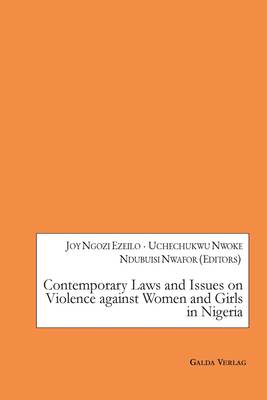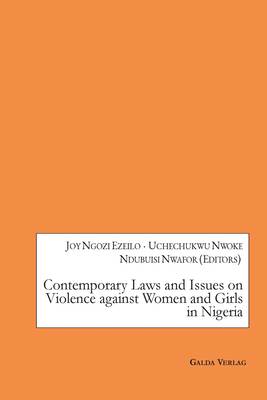
- Retrait gratuit dans votre magasin Club
- 7.000.000 titres dans notre catalogue
- Payer en toute sécurité
- Toujours un magasin près de chez vous
- Retrait gratuit dans votre magasin Club
- 7.000.0000 titres dans notre catalogue
- Payer en toute sécurité
- Toujours un magasin près de chez vous
Contemporary Laws and Issues on Violence against Women and Girls in Nigeria
Ezeilo Joy Ngozi
Livre broché | Anglais
55,45 €
+ 110 points
Description
Women and girls in Nigeria face different levels of sexual and gender-based violence, both in private and public life, often without protection from the law. Compounding the problem of women and their rights is Nigeria's pluralist legal system, which includes Customary and Sharia Laws that often reinforce sex stereotypes and encourage men to view women as subordinate and inferior beings. The Police and the criminal justice system have not satisfactorily offered protection to victims of violence; only reluctantly intervening where absolutely unavoidable. The seeming inability of law enforcement officers (especially the Police) to adequately respond to and investigate cases of violence (especially against women) and to prosecute suspected perpetrators is a major obstacle to addressing the issue of violence against women and girls. In this context, the Women Aid Collective (WACOL) - which deems it imperative to work towards the elimination of all forms of violence against women and girls - organized a conference cum training exercise for Nigerian Police Officers within the Enugu State Police Command in partnership with the Action Aid Nigeria with funding support from the Global Affairs Canada under the Women, Voice and Leadership project. The training exercise, which took place on September 17, 2020, at Dannic Hotels, Enugu, sought to sensitize the Police on existing laws and policies on violence, especially against women and girls. It also tried to strengthen the capacity of the Police to provide effective responses to victims/survivors of violence in search of justice. This edited collection is the end product of the combined conference and training exercise and provides academics, students, activists, feminists, civil society organizations, the security sector, and administrators of justice with information on extant laws protecting women from sexual and gender based violence and expected action to ensure their effective implementation in practice.
Spécifications
Parties prenantes
- Auteur(s) :
- Editeur:
Contenu
- Nombre de pages :
- 212
- Langue:
- Anglais
Caractéristiques
- EAN:
- 9783962032012
- Date de parution :
- 01-05-22
- Format:
- Livre broché
- Format numérique:
- Trade paperback (VS)
- Dimensions :
- 156 mm x 234 mm
- Poids :
- 303 g

Les avis
Nous publions uniquement les avis qui respectent les conditions requises. Consultez nos conditions pour les avis.






